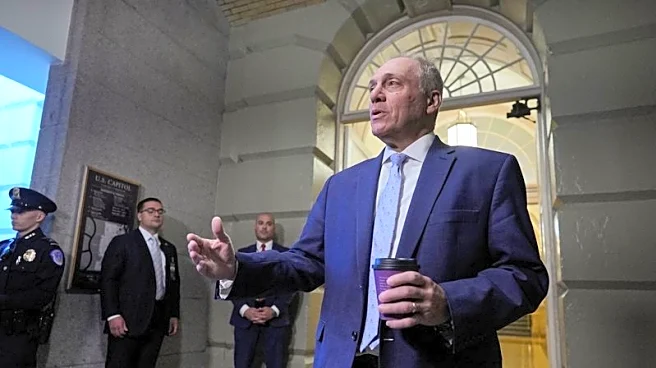WASHINGTON (Reuters) -The White House is seeking legislation that would extend current federal funding until January 31, avoiding a partial government shutdown beginning October 1, Republican U.S. House of
Representatives Majority Leader Steve Scalise said on Tuesday.
“That was a suggestion," Scalise told reporters, adding, “We're still working on the dates and how long it would extend, but that hasn't been finalized yet.”
The stopgap funding bill, if approved by Congress, would continue federal funding of most Washington programs at the current fiscal year's level, although there potentially could be add-ons for "emergency" accounts, such as for Federal Emergency Management Agency disaster relief efforts if needed.
Individual lawmakers could also seek other new initiatives.
Some sort of government funding bill is needed by September 30, the end of the current fiscal year when money expires to operate a range of federal programs.
So far, Congress has not agreed on any of the dozen appropriations bills to operate "discretionary" spending in the fiscal year beginning October 1. This does not include safety-net programs such as Social Security retirement benefits and Medicare and Medicaid health insurance for the poor, elderly and disabled.
U.S. Representative Rosa DeLauro, the senior Democrat on the House Appropriations Committee, issued a statement calling the White House move an "extreme request."
"This is the latest example of the White House trying to thwart the bipartisan appropriations process that invests in our constituents. Any spending package must protect Democratic priorities and Congress's power of the purse," DeLauro said.
Republicans currently hold a 219-212 majority in the House and a 53-47 majority in the Senate, where they would need at least seven Democrats to vote in favor of a continuing resolution or "CR" to meet that chamber's 60-vote threshold to advance most legislation.
In late 2018 and early 2019 President Donald Trump presided over the longest government shutdown in U.S. history: 35 days as he demanded Congress fund the full construction of a "border wall" along the U.S.-Mexico border.
It ended without Congress fulfilling his demand.
(Reporting by David Morgan and Richard Cowan; Editing by Scott Malone, Mark Porter and Daniel Wallis)









